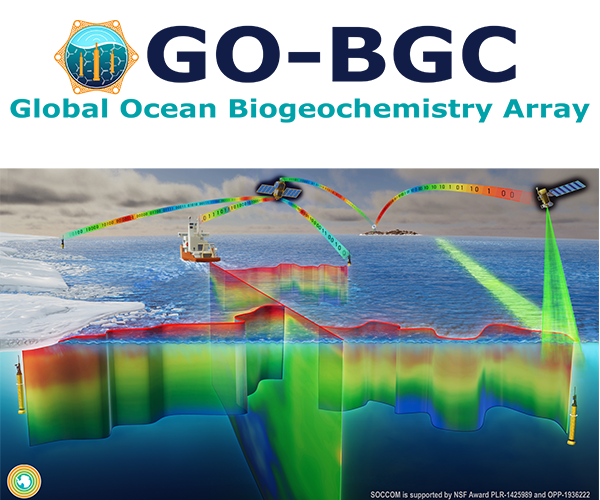January 31, 2024 at 10 am PST/1 pm EST
Register HERE
SPEAKERS
Ellen Park (Woods Hole Oceanographic Institution)
Title: Quantifying biological carbon pump parameters from the global Biogeochemical Argo float array
Abstract: The ocean is a large sink for carbon dioxide and thus plays an important role in regulating the Earth’s climate. This uptake occurs at the air-sea interface through a combination of physical and biological processes, which are commonly referred to as carbon pumps. The biological carbon pump (BCP) transfers carbon against its concentration gradient via the sinking and transport of particulate organic matter that is produced in the surface ocean. In the modern ocean, the BCP is thought to remove an estimated 6-12 Pg C from the surface ocean annually, which is approximately equivalent to total annual anthropogenic carbon dioxide emissions. The magnitude and variability of the BCP’s drawdown of atmospheric carbon dioxide have large uncertainties due to limited measurements across both space and time and the fact that the ocean has varying ecosystem compositions and physical dynamics. Here, we leverage floats with optical backscatter sensors from the global Biogeochemical Argo float array to quantify BCP metrics across different biomes in the global ocean. The particulate backscatter signals can be decomposed into a large, fast sinking particle signal and small, slower sinking particle one. These values are used to estimate BCP metrics such as particulate matter attenuation coefficients and transfer efficiencies. Quantifying these metrics across time and biomes is important for reducing uncertainties in the BCP, improving model parameterizations, and ultimately better constraining the global carbon cycle.
Adam Stoer (Dalhousie University)
Title: Estimating marine phytoplankton biomass and productivity from Biogeochemical-Argo floats
Abstract: Knowledge on the biomass and productivity of ocean phytoplankton is fundamental to our understanding of life on Earth. Phytoplankton are autotrophic microbes at the base of the marine food web, that, through photosynthesis, produce organic matter that sustains higher trophic organisms. In this talk, I estimate the biomass and productivity of phytoplankton by using the fleet of Biogeochemical-Argo floats. In the first part of my talk, I describe a method for estimating net primary productivity using daily cycles of particulate carbon constructed from float profiles distributed across the ocean. This method provides depth-resolved estimates of productivity that are representative of large swathes of ocean, and which are comparable to satellite models. In the second part of this talk, I use the global array of floats to estimate Earth’s stock of phytoplankton biomass, as well as their seasonal and geographic distribution. I also compare the seasonal cycles between carbon biomass stocks and chlorophyll-a concentrations at the surface, a metric commonly-used as a proxy for biomass, and show how surface chlorophyll-a cannot accurately identify the timing of the peak annual bloom in three-quarters of the ocean. Using these observations, I demonstrate how the Biogeochemical-Argo array can provide a more accurate, holistic view of ocean phytoplankton ecology.




